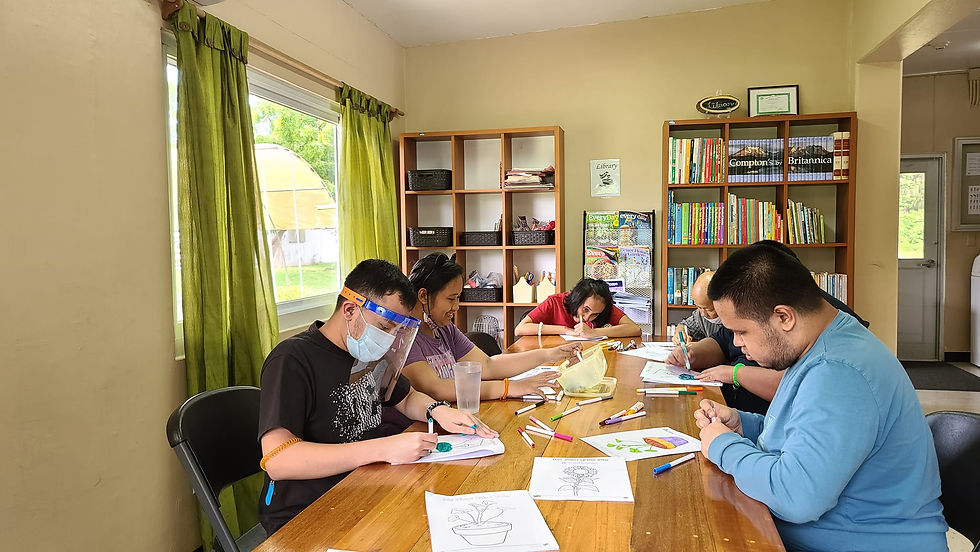Breaking down the barriers: Living independently and with dignity
- Admin

- Mar 16, 2022
- 3 min read

By Bea Cabrera
Saipan—“If you rely on other people to provide for you, it makes you lose a little bit of yourself. It is also difficult to ask for help,” said Matilde Selepeo, administrative assistant at the Center for Living Independently CNMI.
Selepeo positioned her table in the office at an angle where she can see the consumers while they are in class. “I don’t want to miss a thing in their growth and development,” she said.
The center has been servicing people with disabilities since it was established in 2005. It is located on Capital Hill in a big open area where the breeze blows freely, moving treetops and overlooking the turquoise blue Pacific Ocean.
The picturesque location offers a pleasant environment for the center’s consumers. More than killing time away from home and enjoying a peaceful view, the consumers come to the center to learn basic life skills, with a goal to live independently while belonging in the community.
The center is a non-profit organization run by persons with disabilities themselves, according to its executive director, Susan Satur.
Satur, who has hearing and knee arthritis disabilities, has been managing the center for five years. “We have 60 consumers who come to the center and around 64 who we go visit in their homes,” she said. “The ones who come here need more socialization and activities.”
The ones who cannot come to the facility receive house calls from the center’s employees. “We teach them how to cook, help with Social Security and Medicaid at home,” Satur said.
The center is open to people of all ages—from 18 to 80. “We also assist high school students with disabilities. In the summertime, we run a program for them,” she added.
The center’s core services include independent living skills, advocacy, transition, information and peer support and mentoring. “Everyone has a goal when they come here. We help train them to acquire life skills such as financial management, how to utilize public transport, navigate through social security systems, problem-solving techniques and personal safety,” Satur said
“Everything here is done by the consumer. We have a flower garden. We plant taro, kang kong, rosemary, lemongrass, etc. and maintain our own yard. We have a lawnmower, bush cutter and other tools,” Satur added.
Hannah Igisaiar and Ignacio Leon Guerrero are among the consumers at the center, where they learn skills they later share with fellow consumers.
Ignacio teaches cooking. “If the consumer’s goal is to learn how to cook by themselves, this is another learning tool we have at the center,” Satur said.
Igisaiar is a webmaster and social media specialist who manages the center’s website, Facebook and Instagram accounts. She uses an assistive technology, known as an augmentative and alternative communication, to communicate and overcome her speech impairment.
Through federal grants, the center was able to purchase iPads for the center’s clients.. “A lot of them cannot read so I read the newspaper to them in the morning and discuss things happening in the community,” Satur said. “We are very fortunate to get federal grants and funding. We also give big thanks to our local partners and other government offices for making many things possible for us.”
ADVERTISEMENT

Selepeo, for her part, said the center’s relationship with the consumers is more than just a partnership. “There is warmth and familiarity and connection,” she said. “With each consumer, we are touching a soul because we are part of their journey. We have an advantage actually because we live in the islands. In bigger communities, sometimes you lose the concept of what little things are,” shebe said.
Satur said the center’s consumers become productive members of the community. “We have one consumer, who, after all the training and knowledge, has become so vocal and articulate that one partner agency made him a board member. What is remarkable about this person is all that he has learned, he imparts with other consumers. Now, they are following in his footsteps.”
“This person may be just one, but he might have touched five people and those people touch other people and so on,” Satur said. “Things like this make the center more significant and this inspires us to truly have staff and eventually a facility on Tinian and Rota so we can reach more people with disabilities and aid them in the kind of life they want to live.”
Subscribe to
our digital
monthly edition






